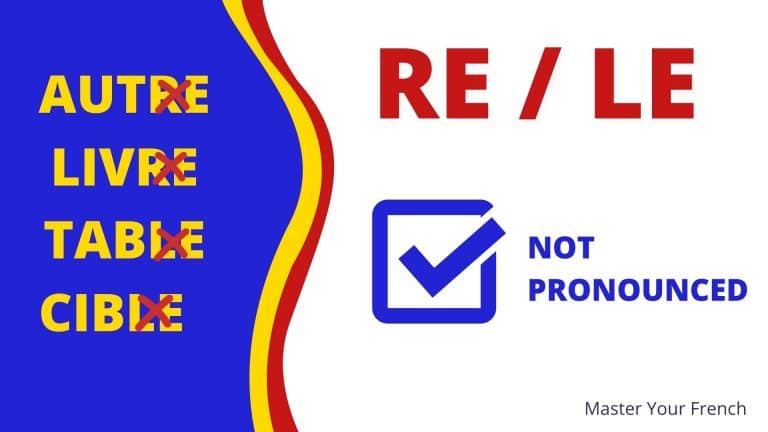RE / LE at the end of the words
Updated: 25 March, 2024 by Mylene in Pronunciation Lessons ▪

Written French is different from the French spoken in everyday life. Do you listen to French series, and you get frustrated because you don’t understand what is being said? While you have been learning French for several years? This is completely normal! There are rules that you must learn and, above all, understand to improve your listening comprehension!
In this article, you will find out that the letters RE and LE can disappear at the end of a word in the spoken language. Please note that you cannot delete these letters in all the words. You have to consider the structure of the sentence. These rules are generally not taught in schools! Learn the rules and practice thanks to the audio and the video.
In what follows, you will discover linguistic notions such as words ending in RE/LE at the end of a sentence or within a sentence, as well as phenomena such as the apocope and the assimilation. You will learn to identify these aspects of the French language for a better pronunciation.
Words ending with RE/LE
First, we will cover the cases where the letters RE / LE are at the end of a group of words or a sentence. As you most certainly know, the letter E is not pronounced at the end of a word. This is the silent E. The consonants /ʁ/ and /l/ have a particular role compared to the other consonants. They are called liquid consonants. We will study one of their specificities below. When a word ends with a consonant followed by RE or LE you must pay attention not to pronounce RE and LE.
For example, in the word livre you have to pronounce one syllable /livʁ/. You don’t have to pronounce the silent E. The consonant /r/ is very soft.
Also, the word possible is pronounced /posibl/. You must pronounce a very soft consonant /l/ at the end of the syllable.
This is only the case if these words are at the end of a group of words or at the end of a sentence.
For example:
- Je viens d’acheter un livre. I just bought a book. (the word livre is at the end of the sentence).
- Je sais que tout est possible mais j’ai quand même un doute. I know anything is possible but I still have a doubt. (The word possible is at the end of the group “tout est possible”)
Words ending with RE/LE within a group of words
Consonant + RE/LE + vowel
We do not pronounce the letter E at the end of a word. The R/L consonants will be pronounced with the vowel of the following word.
For example:
- l’autre exemple. the other example: We do not pronounce the letter E at the end of the word “autre”. The consonant R is pronounced with the vowel E of the word “exemple”: lau-tre-xemple
- une simple idée. a simple idea: We do not pronounce the letter E at the end of the word “simple”. The consonant L is pronounced with the vowel I of the word “idée”: sim-pli-dée
Consonant + RE/LE + consonant
A new phenomenon will occur which is called the apocope. This is the removal of an element at the end of a word. If you do a careful reading, a presentation, you will keep the pronunciation of the silent E at the end of the first word.
For example:
- l’autre jour is normally pronounced /lotʁəʒuʁ/
In everyday life, French speakers will not pronounce the letters RE.
- l’autre jour is pronounced /lotʒuʁ/ by native speakers.
Removing the consonants /ʁ/ and /l/ will allow you to get closer to the accent and the rhythm of the French language. It’s the little extra that will make the difference!
You can remove the letters RE and LE at the end of a word only if R and L are after another consonant. For example, in the word “autre”, the consonant R is found after the consonant T so you can suppress RE orally.
Examples:
- votre maison. your house is pronounced vot-maison. The letters RE are not pronounced because they are located in front of the consonant M.
- une autre fois. another time is pronounced aut-fois.
- une table ronde. a round table is pronounced tab-ronde.
- quatre chiens. four dogs is pronounced quat-chiens.
Assimilation
In the previous section, we just learned that:
- the letter E is not pronounced at the end of a word.
- in a group of words followed by a consonant, the consonants R and L can be deleted.
Now, in this situation, you will have 2 consonants side by side.
Let’s take another example: un litre de vin
We do not pronounce the letter E at the end of the word litre: litr-de-vin. We do not pronounce the letter R in the spoken language because it is in front of another consonant, we will therefore say: lit-de-vin. In this case, the consonants T and D are side by side. The consonant D will influence the pronunciation of the consonant T. This is an assimilation. Un litre de vin is then pronounced “un li-De-vin” (/ɛ̃lid:əvɛ̃/).
Within a word
The deletion of the letters RE / LE can also occur within a word.
For example:
- Autrefois is pronounced aut-fois.
Practice to improve your level of French
Knowing the rule is the first step in your learning. You must now practice what you have just learned. Master Your French has a program dedicated to learning the spoken language.



Very helpful. Thanks!
Bonjour Nels ! Thank you for the comment. I’m glad that you find this article helpful. Mylène